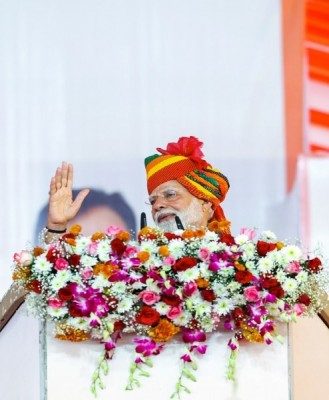
Judiciary is the guardian of the Constitution says Vice President Ansari at lawyer's conference
The theme for this year's Conference is ‘Constitution, Supreme Court and Social Justice’.
Governor of Karnataka, Vajubhai Vala, Chief Minister of Karnataka, Siddaramaiah, Karnataka Law Minister T.B. Jayachandra and other dignitaries were present on the occasion.
Vice President Ansari, in his address, said that the agenda for political, economic and social democracy remains unfinished because of continued disparity between the lives of the privileged and the rest and because of persistent ineptitude and un-accountability in the way the economy and society are organised.
The Vice President said that the makers of our Constitution were well aware of the glaring social inequalities that existed in Indian society and sought to attain Justice, Liberty, Equality and promotion of Fraternity.
 Even the best intentioned judicial intervention and activism on social issues has limits, he added.
Even the best intentioned judicial intervention and activism on social issues has limits, he added.
The Vice President said that the judiciary is the guardian of the Constitution and its role as the protector of civil rights has reposed the faith of the people in it.
The Supreme Court has given a dynamic shape to the concept of social justice and expanded the envelope of social justice by adjudicating on diverse social matters concerning education, livelihood, gender and environment, he added.
Citing examples of how, after 70 years of legislating welfare laws and adjudicating measures to deliver social justice, the ground reality remained dismal, the Vice President said that there are a number of reasons why attempts to litigate economic, social and cultural rights may not result in judicial enforcement and why, even if enforcement is achieved in formal terms, this may not necessarily protect or fulfil the right in practice.
He said that the requirement thus is of ‘a broad societal rather than a just political perspective’.
While not dismissing a constructive role for courts in the enforcement of economic, social and cultural rights, it is crucial to investigate carefully who benefits from court enforcement and under what circumstances judicial enforcement is likely to advance the broader realization of the rights and benefit those whose rights are most at risk, he added.
Images: PIB
Support Our Journalism
We cannot do without you.. your contribution supports unbiased journalism
IBNS is not driven by any ism- not wokeism, not racism, not skewed secularism, not hyper right-wing or left liberal ideals, nor by any hardline religious beliefs or hyper nationalism. We want to serve you good old objective news, as they are. We do not judge or preach. We let people decide for themselves. We only try to present factual and well-sourced news.







